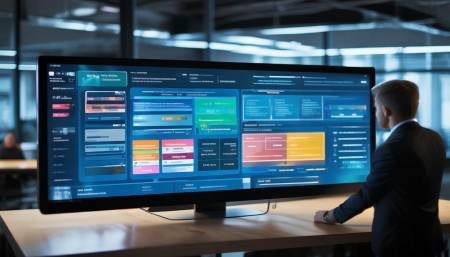
△Click on the top right corner to try Wukong CRM for free
Hey there! So, you've probably heard about this thing called a Customer Management System, or CRM for short. It's kind of a big deal in the business world these days. Imagine having a super smart assistant that keeps track of all your customer interactions, from emails to phone calls, and even social media chats. That's what a CRM does, and it's like having a personal secretary who never sleeps.
Now, let's get into why CRMs are so popular. You see, in today's fast-paced world, keeping up with customers can be a real challenge. There's just so much going on, and it's easy to lose track of who said what and when. But with a CRM, you don't have to worry about that. It helps you stay organized and makes sure you're always on top of things. Plus, it's not just about keeping track; it's also about building better relationships with your customers. And we all know how important that is, right?
Let me give you an example. Say you run a small business, and you've got a bunch of loyal customers. With a CRM, you can keep notes on each one, like their preferences, past purchases, and even little details like their birthday. This way, when you reach out to them, it feels more personal. It's like remembering someone's favorite ice cream flavor and surprising them with it. It's those little touches that make a big difference.
But wait, there's more! A good CRM system doesn't just help you remember stuff; it also gives you insights. You can see which marketing campaigns are working, which products are selling the most, and even predict what your customers might want next. It's like having a crystal ball, but instead of predicting the future, it's helping you make smarter decisions based on data. And who doesn't love making informed choices?
One of the coolest things about CRMs is that they can be customized to fit your specific needs. Whether you're a small startup or a large corporation, there's a CRM out there for you. Some of the big names in the industry include Salesforce, HubSpot, and Zoho. Each of these platforms has its own set of features, so you can pick the one that works best for your business. It's kind of like choosing the perfect pair of shoes—everyone's feet are different, and you want something that fits just right.
Now, I know what you might be thinking: "This all sounds great, but is it really worth the investment?" Well, let me tell you, it can be. Think about it this way: if you can improve your customer service, increase sales, and streamline your operations, wouldn't that be worth it? Of course, it depends on your specific situation, but many businesses find that the benefits far outweigh the costs. Plus, a lot of CRM systems offer free trials, so you can test them out before committing. It's like trying on a new outfit before you buy it—no harm, no foul.
Another thing to consider is the learning curve. Some people might be a bit intimidated by the idea of using a new system, especially if they're not very tech-savvy. But don't worry, most CRMs are designed to be user-friendly. They often come with tutorials, support, and even dedicated customer service teams to help you get started. It's like having a personal trainer at the gym—someone who's there to guide you and make sure you're doing everything right.
And here's a fun fact: CRMs aren't just for sales and marketing. They can be used across different departments, like customer service, HR, and even IT. For example, if you're in HR, you can use a CRM to manage employee data, track performance reviews, and even handle recruitment. It's like having a Swiss Army knife for your business—a tool that can do a lot of different things.

So, let's talk about some of the key features you might find in a CRM. First up, contact management. This is where you store all the information about your customers, like their names, addresses, and contact details. It's like having a digital Rolodex, but way more powerful. Next, you've got sales automation. This feature helps you manage your sales pipeline, from initial contact to closing the deal. It's like having a roadmap for your sales process, and it can save you a ton of time and effort.

Then there's marketing automation. This is where you can create and manage marketing campaigns, send out emails, and even track their effectiveness. It's like having a marketing wizard at your fingertips. And let's not forget about analytics. A good CRM will give you all sorts of reports and dashboards, so you can see how your business is performing at a glance. It's like having a dashboard in your car, but instead of showing you your speed and fuel level, it's showing you your sales numbers and customer satisfaction rates.

Now, I know some of you might be wondering, "What if I already have a system in place? Do I really need a CRM?" Well, that's a great question. If you're happy with what you've got and it's working for you, then maybe you don't need a CRM. But if you're finding that your current system is a bit clunky, or if you're spending too much time on manual tasks, then a CRM could be a game-changer. It's like upgrading from a flip phone to a smartphone—once you make the switch, you'll wonder how you ever managed without it.
Another common concern is data security. After all, you're trusting a CRM with a lot of sensitive information. But rest assured, most reputable CRM providers take security very seriously. They use advanced encryption, regular backups, and other measures to keep your data safe. It's like having a high-tech vault for your business information. And if you're still worried, you can always ask for more details about their security protocols. Most companies are happy to share that information with you.
So, now that we've covered the basics, let's talk about some of the more advanced features you might find in a CRM. One of my favorites is AI and machine learning. These technologies can help you analyze customer behavior, predict trends, and even suggest the best times to reach out to your customers. It's like having a super-smart advisor who's always looking out for your best interests. Another cool feature is integration with other tools. Many CRMs can connect with your email, calendar, and even your accounting software. This means you can work more efficiently and avoid having to switch between different apps all the time. It's like having a single hub for all your business activities.
And let's not forget about mobile access. In today's world, we're always on the go, and having a CRM that you can access from your phone or tablet is a huge plus. It means you can stay connected to your business no matter where you are. It's like having a portable office in your pocket. And if you're working with a team, a CRM can help you collaborate more effectively. You can share notes, assign tasks, and even set reminders for your colleagues. It's like having a virtual whiteboard where everyone can contribute and stay on the same page.
So, to sum it all up, a CRM is a powerful tool that can help you manage your customer relationships, streamline your operations, and make data-driven decisions. It's like having a Swiss Army knife for your business, with all sorts of useful features to help you succeed. And while it might seem like a big investment at first, the benefits can be well worth it. Just think about all the time and effort you'll save, and the improved relationships you'll build with your customers. It's a win-win, if you ask me.

Alright, I hope that gives you a good idea of what a CRM is all about. But I'm sure you've got some questions, so let me try to answer a few of them.
Q: Is a CRM only for big businesses, or can small businesses benefit from it too? A: Absolutely, small businesses can benefit from a CRM just as much as big ones. In fact, a CRM can be especially helpful for small businesses because it helps you stay organized and efficient, even with limited resources.
Q: How long does it usually take to set up a CRM system? A: The setup time can vary depending on the complexity of your business and the CRM you choose. Some simple CRMs can be up and running in a day or two, while more complex ones might take a few weeks. But most CRMs offer support and training to help you get started quickly.
Q: Can a CRM integrate with other tools I'm already using, like email and accounting software? A: Yes, many CRMs can integrate with a wide range of tools, including email, calendars, and accounting software. This makes it easier to manage all your business activities from one central platform.
Q: What if I'm not very tech-savvy? Will I still be able to use a CRM? A: Don't worry, most CRMs are designed to be user-friendly, even for those who aren't very tech-savvy. They often come with tutorials, support, and dedicated customer service teams to help you get started and make the most of the system.

Q: How can a CRM help with customer retention? A: A CRM can help you keep track of customer interactions, preferences, and history. This allows you to provide personalized service, follow up with customers, and address any issues promptly. By building stronger relationships, you can improve customer satisfaction and loyalty, leading to better retention.
I hope that helps! If you have any more questions, feel free to ask. Happy CRM-ing!
Related links:
Free trial of CRM
Understand CRM system
AI CRM Systems

△Click on the top right corner to try Wukong CRM for free